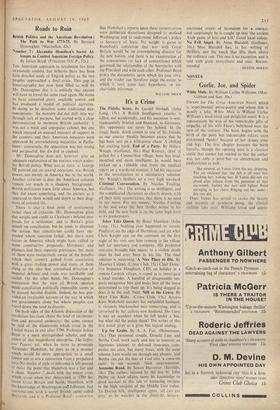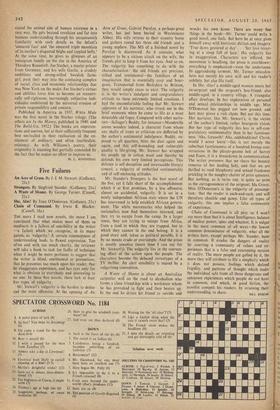NOVELS
• Gurlie, Joe, and Spider
White Mule. By William Carlos Williams. (Mac- Gibbon and Kee, 30s.)
EXCEPT for The Great American Novel, which is 'experimental' prOse-poetry and whose title is mostly a joke, White Mule is William Carlos Williams's most vivid and delightful novel. It is a repossession, by way of his remarkable gifts of empathy, of his wife Floss's babyhood near the turn of the century. The book begins with the birth of the puny but indomitable infant, soon nicknamed 'Spider' because of her skinny arms and legs. The first chapter presents the birth literally, though the opening note is a classical s simile that cannot but remind us that the author was not only a poet-but ,an obstetrician and paediatrician as well: She entered, as Venus from the sea, dripping. The air enclosed her. she felt it all over her, touching her. waking her. If Venus did not cry aloud after release from the pressures of that sea-womb, feeling the new and lighter flood spr;nging in her chest, flinging out her arms— this one did. . . .
()nee Venus has served to evoke the beauty and mystery of newborn being, the clinical realities take over. Williams loved and appre-
elated the animal side of human existence in a rare way. He gets beyond revulsion and far into humane -understanding through his unsqueamish familarity with such details as the infant's `smeared face' and 'the smeared triple mountain of its mother's disgusted thighs and toppled belly.' At the same time, he gives us glimpses of an immigrant family on the rise in the America of Theodore Roosevelt. Joe Stecher, a master printer from Germany, and his wife Gurlie, a crudely ambitious and strong-willed Swedish farm- girl, push their way into the confusing complex of racial, class and economic relationships that was New York on the make. Joe Stecher's virtues and abilities force him to become an eccentri- cally self-righteous, increasingly subjective indi- vidualist embittered by the universal erosion of private responsibility and concern.
Published in America in 1937, White Mule was the first novel in the Stecher trilogy. (The others are In the Money, published in 1940, and The Build-Up, 1952.) The books are unpreten- tious and uneven, but at their sufficiently frequent best unrivalled in their realisation of the ex- citement of ordinary, and often inarticulate, existence. As with Williams's poetry, their originality is stunning but partially concealed by the fact that he makes no effort to impress us.
M. L. ROSENTHAL































 Previous page
Previous page